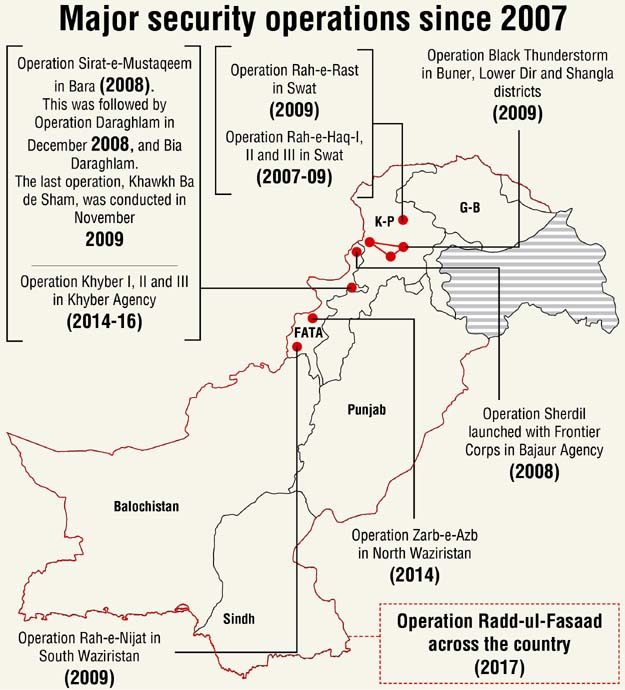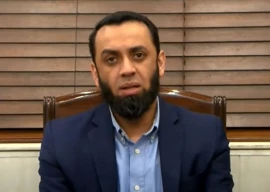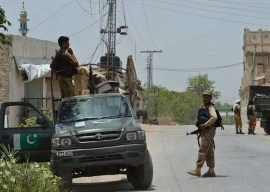
The decision to mount the operation was taken at a high-level meeting chaired by army chief General Qamar Javed Bajwa at the corps headquarters in Lahore. Attendees included the head of Punjab Rangers and officials of intelligence agencies.
Terrorists killed, sanctuaries destroyed in Pak-Afghan border air blitz
“The operation aims at indiscriminately eliminating residual/latent threat of terrorism, consolidating gains of operations made thus far and further ensuring security of the borders,” reads a statement issued by the military’s media wing.
The Inter-Services Public Relations (ISPR) said Pakistan Air Force, Pakistan Navy, civil armed forces and other security and law enforcement agencies would also participate and support the efforts to eliminate the menace of terrorism from the country.
Significantly, the focus of the countrywide offensive will be Punjab, which many observers believe has long been ignored when it comes to fighting militant groups due to political expediency and other reasons. The fact that the decision was taken during a meeting in Lahore also suggests that Punjab will be central to the Operation Radd-ul-Fasaad.
The ISPR said broad spectrum security and counter terrorism operations would be conducted by the Rangers in Punjab in continuation of the ongoing operations across the country.
Hours before the ISPR announcement, the federal government approved a request by the Punjab government seeking deployment of over 2,000 Rangers personnel in the province to carry out the anti-terror offensive. The paramilitary force will have the policing powers to conduct intelligence-based raids throughout the province.
Army chief vows to pursue Kulbhushan case to finish
The initiative appears to be a part of efforts by the new army chief to show that he is determined to take the ongoing fight against terrorism to its logical end.

Following the recent wave of terrorist attacks, some in the country have started drawing his comparison with his predecessor General (retd) Raheel Sharif, who was credited with turning the tide against militancy.
Although Operation Radd-ul-Fassad was being launched as continuation of the National Action Plan approved after the massacre in Army Public School, Peshawar in December 2014, Gen Qamar seems to set his own legacy in taking the militancy head on.
This is overall 11th military operation launched in the country since 2007 when the country adopted a comprehensive strategy to deal with terrorism. But most of earlier campaigns restricted to the tribal regions, Balochistan and Karachi.
This has led many critics to conclude that unless a comprehensive crackdown is launched in urban centers particularly in South Punjab.
Gen Qamar Javed Bajwa visits ISPR office, lauds its role
One of the major criticism facing both the civil and military authorities was the lack of implementation of NAP particularly when it comes to dealing with certain militant groups.
But this seems to change now since the current army chief is believed to be against the policy of ‘flirtation with militants,’ remarked a retired military official, who knew Gen Qamar closely and his approach.
The detention of Jammatud Dawa (JuD) chief Hafiz Saeed was also seen as the current military leadership’s ‘zero tolerance’ to militancy.
Sources said as part of the new strategy, banned organisations would not be allowed to stage public rallies or protests. Another major aspect of the decision is to start a countrywide de-weaponisation and explosive control campaign.
Under Operation Radd-ul-Fasad, the focus would be on more effective border security management, the ISPR said.
After clearing terrorist hideouts from the tribal region, Pakistan is now emphasizing on the need for better border management with Afghanistan.
Published in The Express Tribune, February 23rd, 2017.
1719315628-0/BeFunky-collage-(8)1719315628-0-405x300.webp)


1731329418-0/BeFunky-collage-(39)1731329418-0-165x106.webp)





1731771315-0/images-(3)1731771315-0-270x192.webp)







COMMENTS (3)
Comments are moderated and generally will be posted if they are on-topic and not abusive.
For more information, please see our Comments FAQ